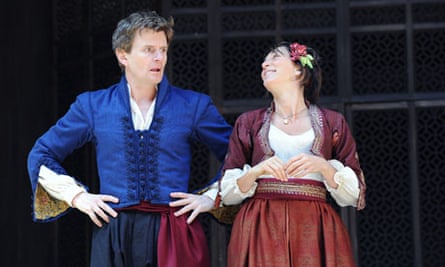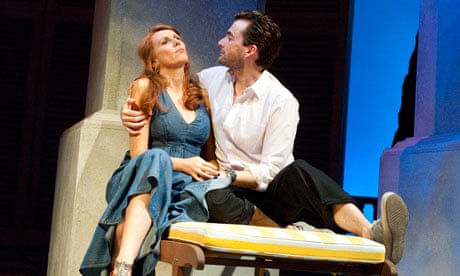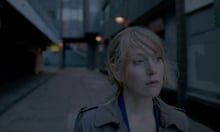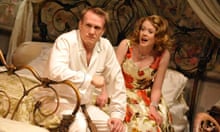He could have called it "A Lot of Fuss About Fannies". Even if you go to Shakespeare's play without a glossary explaining that "nothing" was Elizabethan slang for "vagina" (no prizes for what "something" meant), it's hard to miss the sexual urgency of Much Ado About Nothing.
Unless you go to Josie Rourke's Tennant-Tate production, where the action is non-stop, the conceits multifarious, the audiences rapt, the box office happy, a central dynamic of sadness and near disappointment is missing. This is not Shakespeare's most lyrical romance, or the most multi-layered in its analysis of love. It is the most desperate. Beatrice and Benedick (not the triggers of the plot, but they're so vain they think this play is about them) are running out of time. They are beginning to be short of stratagems that will keep them locked together in vibrant antagonism.
It's the perfect vehicle for two snappy stars. It's evenly balanced, with cutting lines equally distributed between the would-not-be lovers. It doesn't require the woman to pretend to be a man. Catherine Tate and David Tennant have been long awaited in these roles, and Rourke's production, set in the 1980s, is determined to display their gifts. Tate is sulky in dungarees, clad in her am-I-bovvered face and voice. She is fluent and funny but on one note: grimacing and doing comic turns – Frankie Howerd at one point. Tennant, graceful and sardonic, reveals a talent for slapstick, an elegance of movement, an exceptional ease with everything that slips off his tongue. So far, so fairly good.
Rourke's time-travelling involves moving the action not only to the 1980s but to Gibraltar, with soldiers returning home, perhaps from the Falklands: there are ra-ra skirts, big sound systems, a Princess Di meringue wedding dress, a little boy doing a Rubik's Cube, non-stop smoking and a blarey, glarey, hen-and-stag party atmosphere. At the end – it's one of the production's strongest points – the two self-thwarting lovers do look as if they have been released into a happier clime. Tennant seems to have lost years, to have become more innocent and playful. Tate stops looking as if she wants to butt everyone who crosses her path.
The updating is plausible enough but it doesn't – as did Rupert Goold's recent and more violent reworking of The Merchant of Venice – offer revelation. It does induce naturalism in the speaking, which is a relief: no one behaves as if they were in a Restoration comedy battling it out for a bon mot with Maggie Smith; no one is fruity. Elliot Levey (an actor to look out for) makes something unusual of the villainous Don John: he's prissy and awkward in his skin, camp and writhing. It's a long time since someone other than a mechanical or a wench dared an Estuary accent in a Shakespeare play: well, Catherine Tate does. David Tennant's Scots accent is inw another category – above posh.
Beyond this, the real point of much of the activity is puzzling, though the stage keeps revolving as if to persuade us that things are really on the move. Painters and decorators are constantly plying their trade around Robert Jones's bland pillar-and-cypress design: it's hard to see why they are doing so until they enable a scene in which Tennant gets himself covered in paint and Tate is hoisted to the skies on a builder's pulley. The first round of applause on press night was caused not by a person but a jeep, and not even the jeep itself but the warning bleeps it emitted as it reversed.

Over at the Globe, Jeremy Herrin's production offers something completely different – a version of the play that involves no moving parts: when Beatrice is eavesdropping she shelters under washing on a line; Benedick sneaks behind the permanent pillars on the Globe stage.
Herrin's production suggests the lovers' maturity in the colours that fill the stage. The gowns are coppery browns and oranges, the shades of autumn leaves, and of the fruit that hangs over the stage. Against a lattice of dark wood is a tree from which dangle oranges, a reminder of the citric imagery of the play – in which a discarded bride is compared to a rotten fruit and Seville and civil are crucially punned. Philip Cumbus cleverly creates an awkard Claudio and Matthew Pidgeon a saturnine Don John.
Eve Best has been lost to New York, and to screens big and small, for too long: she's been being best friends to Nurse Jackie and slipping into the lizardly skin of Wallis Simpson. It is extraordinary that she should return to the London stage in this most no-holds-barred theatrical arena, but she looks as if she's never been off it. There's nothing telly tiny about her performance. On the contrary: she's forever on the move, on her toes, as if waiting to leap into a new life: she springs and jigs across the stage, and her dancing suggests lightness, exhilaration, openness, even while her mouth is firing off sourness. "My Lady Tongue" Benedick calls her, but she reminds us, looking up at the skies, as she ruefully delivers one of the loveliest of lines, that "there was a star danced, and under that was I born". The contradiction of word and gesture is entirely beguiling. And well matched by Charles Edwards's Benedick, who is an unexpected mixture of the lolling and the hesitant: he languids in with an air of entitlement, but turns out to be diffident: when it takes him three stuttering goes to spit out the word "husband", he seems to be stammering from anxiety as much as hatred.
The language of these lovers is companionable, even when they are denying it: they bump their shoulders together like old playfellows; when they fly apart, they echo each other's gestures. When they kiss, a huge roar goes up from the spectators. This may be low-tech but it is high emotion.




Comments (…)
Sign in or create your Guardian account to join the discussion